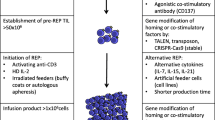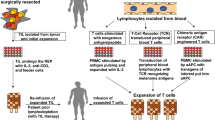Abstract.
Adoptive therapy for cancer using tumor-infiltrating lymphocytes (TIL) has mainly been investigated in cancer patients with advanced stage disease. The limited clinical success has not been encouraging, although this might be explained by poor TIL specificity and/or high tumor burden. To re-evaluate the effectiveness of adoptive therapy, we analyzed the capacity of tumor-reactive TIL injection in preventing the further development of disease in stage III melanoma patients after complete tumor resection. A phase II/III randomized trial was performed on 88 melanoma patients, who received autologous TIL plus interleukin-2 (IL-2) or IL-2 only. The duration of relapse-free survival was analyzed, taking into account the immunological specificity of injected TIL and the number of metastatic lymph nodes removed before treatment. Kaplan-Meyer analysis revealed that the injection of tumor-reactive TIL was statistically correlated with prolonged relapse-free survival in patients with only one metastatic lymph node. Therefore, improved clinical outcome could be obtained after adoptive therapy by selecting appropriate groups of patients and monitoring the specificity of the injected TIL populations.
Similar content being viewed by others
Author information
Authors and Affiliations
Additional information
Electronic Publication
Rights and permissions
About this article
Cite this article
Labarrière, N., Pandolfino, MC., Gervois, N. et al. Therapeutic efficacy of melanoma-reactive TIL injected in stage III melanoma patients. Cancer Immunol Immunother 51, 532–538 (2002). https://doi.org/10.1007/s00262-002-0313-3
Received:
Accepted:
Issue Date:
DOI: https://doi.org/10.1007/s00262-002-0313-3




